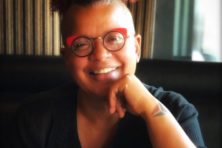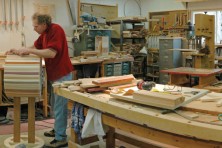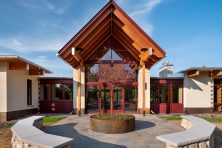Faith Adiele: Breaking the Rules One Residency at a Time
- Share
- Tweet
- Pin
- Share

Faith Adiele keynotes Write On’s 10th-anniversary gala
In the spring of 2021, Faith Adiele received a request to judge a non-fiction contest. Nothing out of the ordinary there. She’s asked to do (and does) a lot of things – lead international writing workshops; pen stories to lull people to sleep for HBO’s A World of Calm series; and contribute pieces about Morocco’s only Black hotelier for the Miami Herald, protest art for the Smithsonian Folklife, and a profile on artist Lava Thomas for the Alta Journal.
That’s just scratching the surface. She also became Thailand’s first Black Buddhist nun, and wrote a memoir about the experience called, Meeting Faith.
So when Adiele, also an associate professor at the California College of Arts and a self-described “mixed-race travel memoirist,” was asked to be a judge for Peninsula Pulse’s annual Hal Prize, she “was intrigued by the idea of a newspaper holding an old-school contest,” she said. “It was awesome and random.”
After a bit more digging, noting Write On, Door County’s residency opportunities, she inquired about judging in exchange for the space and time to write on the writing center’s 59-acre campus – complete with classrooms, an atrium, library, three-bedroom home, and plenty of cozy chairs and nooks to settle in when inspiration strikes. Done.
“It was terrific. I was charmed by submissions, rewarded a residency,” she said. “Door County is just gorgeous – good for creativity.”
Adiele’s residency coincided with Write On, Door County’s Health and Healing Conference, so she also held a workshop, her forté.
Two years later, she’s returning to Write On, Door County as a keynote speaker for the organization’s Oct. 26 gala and10th anniversary-celebration.
And, of course, she’ll also lead a workshop.
A Room of One’s Own
In her keynote address, Adiele said she plans to “discuss the importance of residency, a room of one’s own,” she said. One of her goals and current services is “making opportunities visible, in particular to marginalized groups,” she explained. “If you don’t go to graduate school, you don’t know about residencies – the best practices on how to apply, how to find one, the different types.”
If you’re unfamiliar with the term “residency,” it’s defined as a program that provides temporary residence and workspace for artists of all kinds to work on specific projects. There are fully-funded, semi-funded, and un-funded residencies; international residencies (Adiele’s favorite); and they are open to emerging and established artists alike. Adiele has taken advantage of residencies in South Africa and France, as well as Miami, Florida; Chesapeake Bay, Virginia; and Evanston, Illinois.
“I find the best residencies serve both the artist and the community,” Adiele said. “You might be surrounded by people who are living less resourced and I don’t want to be just extractive, taking resources. How can I embed in the community, add some cultural value? What can I bring?”
For example, during a recent residency in sub-Saharan Africa, Adiele led a DJ-mixing workshop for women.
“We received pushback,” she said, laughing. “But all these people came and it was beautiful. It’s fun to push the needle on what’s considered a cultural norm.”
Though Adiele often acts as the teacher, she often finds herself learning as well, growing from the experience, and finding new perspectives. It’s easy to get off-topic when conversing with her, meandering down a rabbit hole of her travel experiences – like when she hosted a class for Moroccan students and was confused by why they would want to write in English when they can speak multiple languages.
“The young people there are trying to get rid of French,” she explained. “They see that as a colonizers’ language. English is a language of freedom. As a Nigerian, English is the language of colonizers. But English has an elasticity – it brings in words from so many other languages. French doesn’t do that. French prides itself on its purity. American English is very fluid, sloppy, new. They say, ‘I’m free in this language. I can be clear, say things I can’t say in French or express in Arabic.’”
See? Fascinating.

Two-Day, Revision Bootcamp Workshop
And if you’re searching for a way to express yourself in fiction, non-fiction, or poetry, Adiele will co-host a two-day workshop on Oct. 27-28, with writer Elmaz Abinarder, called “Revision Bootcamp: All-Genre Intensive.” (This aspiring novelist will be there, so please join me!)
“Revision can be the hardest thing, particularly for beginner writers,” Adiele said. “You’re worried to take something apart – you worked hard on it, it came from your muse. But we’re going to talk about what revision is, think about all the possibilities. It will be playful and fun, really fun, trying on different things, playing with voice and form. We’re gonna blow up that idea of craft.”
Adiele is hoping to draw writers from all genres, “whether you’re working on a novel, book of poetry, non-fiction, travel,” she said. “This helps people play and not pay attention to ‘the rules.’”
Rules really aren’t her thing.
To purchase tickets to Write On, Door County’s 10th Anniversary Gala, or to reserve your spot in Adiele’s workshop, visit writeondoorcounty.org. For more information about Faith Adiele and her work, visit adiele.com.




